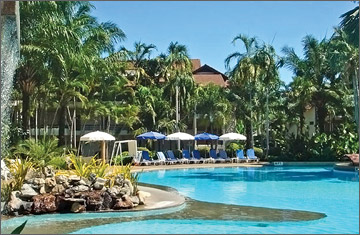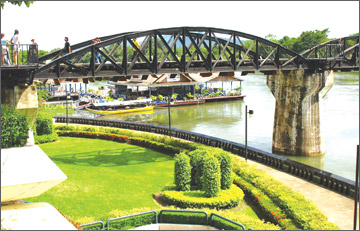The unique Tiger Temple of Thailand
By Shirajiv SIRIMANE in Thailand
 Tigers have been synonymous with flesh and blood as they are
carnivorous and are considered to be one of the most feared species of
animals on Earth. Tigers have been synonymous with flesh and blood as they are
carnivorous and are considered to be one of the most feared species of
animals on Earth.
This was one of the main reasons for the animal to be hunted by man
which resulted in tigers being named an endangered species.
However, this cycle has been reversed in Thailand where tigers are
left in peace to breed, feed and even roam with humans in the tiger
temple in Kanchanaburi in western Thailand.
It was an injured tiger that paved the way for this world's first
tiger temple, way back in 1994.
The injured tiger made it to the nearby temple where the priests
nursed its injuries and provided food for the animal to limp back to
health.
When the tiger recovered, it was released back to the jungle but it
did not want to leave the temple and became a permanent resident there.
One month later, another tiger joined it and formed a family.
One of the monks said that the tiger and the priests respected each
other and soon this became a friendship. "We were at first a bit
hesitant to go near the tiger. However, over time, we developed a
friendship and trust with the animal and soon we lost our fears", the
monk said.
The government, around this time, brought in an Act banning the
rearing of tigers in private homes and people who used to own tigers
released them near the temple. As of 2007, over 21 cubs have been born
at the temple, and the total number of tigers is about 12 adults and
four cubs.
"These tigers lived with humans and could not go back to the jungle
and they preferred to stay with us. The temple too welcomed them and as
of late March 2011, the total number of tigers living at the temple has
risen to almost 90," the monk said. The Tiger Temple practices a
different conservation philosophy than in the west. Being a forest
monastery, no alcohol is allowed at the site. Additionally "appropriate"
clothing must be worn by women, covering their shoulders and knees, so
as not to offend the working monks within the site.
The Buddhist temple in Kanchanaburi has become a major tourist
attraction even surpassing the Bridge on the River Kwai and is one of
the few places in the world where visitors are allowed to touch tigers.
" People are given the opportunity to work with the animals for a
short period and the memories they take away are priceless,"? the monk
said.

Felix River Kwai Resort Kanchanaburi |

Bridge on the River Kwai |
The temple is rearing Swine, deer and cattle and is also reforesting
a large amount of land nearby ('Buddhist Park') to give tigers a chance
to be released into the wild in the future.
Due to its popularity, Thailand Tourism, together with Cathay
Pacific, is opening the world's first tiger park manned by Buddhist
monks to the Sri Lankan public. The airline, which operates three
flights a week on Monday, Wednesday and Friday has organised a special
package which also provides a night in Felix River Kwai Resort, the only
five-star resort in Kanchanaburi.
Built in 1991 and only two hours from Bangkok, the resort sits on a
103 Rai plot of pristine river front land adjacent to the famous Bridge
on the River Kwai.
The resort maintains 255 rooms and suites, each with a private
balcony and has a large garden. It even offers dinner on a river cruise
that goes under the Kwai Bridge. The package includes a stay in Bangkok,
a visit to the Bridge on the River Kwai and its museum and the
well-maintained historic cemetery which is maintained by Australians and
British.
|

